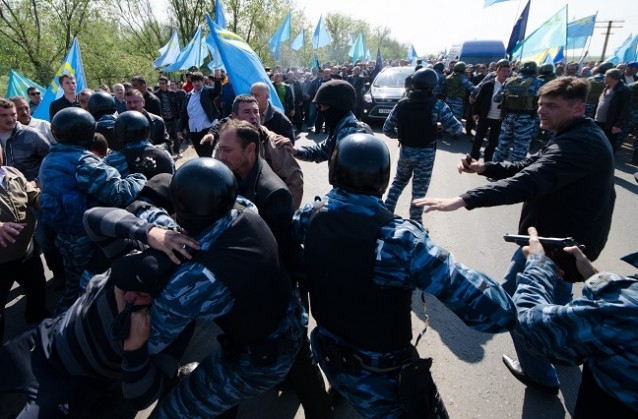When Refat Chubarov, a political leader of Crimea’s indigenous Tatar population, attempted to cross the border into his homeland on Saturday, he was met by squads of Russian riot police and a prosecutor who handed down a mandate banning him from the Black Sea peninsula for five years. While this is the second time pro-Russian authorities have banned an ethnic Tatar leader from returning to Crimea since Russia’s controversial annexation of the territory in March, Chubarov believes his exile is only a “small piece of the huge injustice that is now taking place in Crimea.”
Ukraine’s Foreign Ministry slammed the ban on Chubarov, stating, “the Kremlin’s absurd decision is the result of hatred and the chauvinistic policy which the Russian Federation, following Stalin’s tradition, has been carrying out with respect to the Crimean Tatar people since the beginning of the armed occupation and annexation of the Crimea.” The Muslim Tatar ethnic minority group, which is indigenous to the Black Sea peninsula and currently makes up 14 percent of the population, has faced a long history of persecution at the hands of Russian rulers.
Shortly after Russia claimed Crimea as part of its territory in March, a 39-year-old Tatar father of three, Reshat Ametov, was murdered for participating in pro-Ukraine protests in the Crimean capitol of Simferopol. While most Tatars abstained from voting in the referendum that made Crimea part of Russia, those who participated had their ID papers confiscated. In the weeks following the annexation, they complained that their homes were marked with ominous crosses reminiscent of persecution they faced under Soviet rule. And separatists authorities ordered the Tatars to vacate the land they have lived on since they were allowed to return to the peninsula after nearly 50 years of exile. Since March, more than 5,000 Tatars have already fled Crimea.
As Chubarov is the chairman of the Crimean Tatars’ self-governing body, the Mejlis, his exile strikes a significant blow to the Tatars’ political representation. In April, former chairman Mustafa Jemiliev was also blocked from returning to the country. While Russian authorities accused Chubarov of fomenting “activities to incite inter-ethnic hatred,” many indigenous Tatars fear that, with the removal of their political leadership, history is poised to repeat itself.
Crimean Tatars have a long and painful relationship with Russian authorities. During World War II, Crimea was occupied by Nazi Germany. When the Soviet Union retook the peninsula in 1944, Stalin accused the Muslims Tatars of collaborating with the enemy. As punishment, Stalin ordered the forced deportation of all Tatars to Central Asia and Siberia, where 40 percent of their population died. Many Tatars returned to their homeland after the fall of the Soviet Union in 1989 and embraced Ukrainian citizens. In May, the self-proclaimed head of annexed Crimea effectively banned Tatars from participating in remembrance ceremonies to mark the 70th anniversary of the 1944 deportations.
Chubarov’s exile may have been prompted by the public statements he made last month condemning separatist authorities’ decision not to permit Tatars to celebrate their annual Flag Day in the center of Simferopol, instead relegating the celebrations to the outskirts of the city. “This is segregation of the Crimean Tatars,” said Chubarov just weeks before he was barred from returning to Crimea.
His banishment comes just two days after Russian President Vladmir Putin spoke of the need to “consolidate civic solidarity and inter-ethnic harmony” in an address to the Council of Inter-ethnic Relations. In other countries, “neo-Nazi organizations are reviving and gaining political weight, and ethnic and religious intolerance, calls to violence are becoming a slogan for forces seeking power,” said Putin.
While the discrimination against Tatars goes to show that pro-Russian authorities in Crimea are actively undermining inter-ethnic tolerance, right-wing forces within Ukrainian politics are also guilty of persecuting minority groups and committing grave human rights violations. Ukrainian MP Oleg Lyashko, a popular pro-unity figure who came in third place in Ukraine’s May presidential elections with eight percent of the vote, posted a video of himself abducting and interrogating the defense minister of the self-proclaimed People’s Republic of Donetsk at gunpoint. In the video, the kidnapped minister shows signs of torture, including deep gash wounds, yet the crime remains uninvestigated and Lyashko continues his career as a rising star within Ukrainian politics.
Chubarov announced Monday that he would appeal his entrance ban.
Source: ThinkProgress



